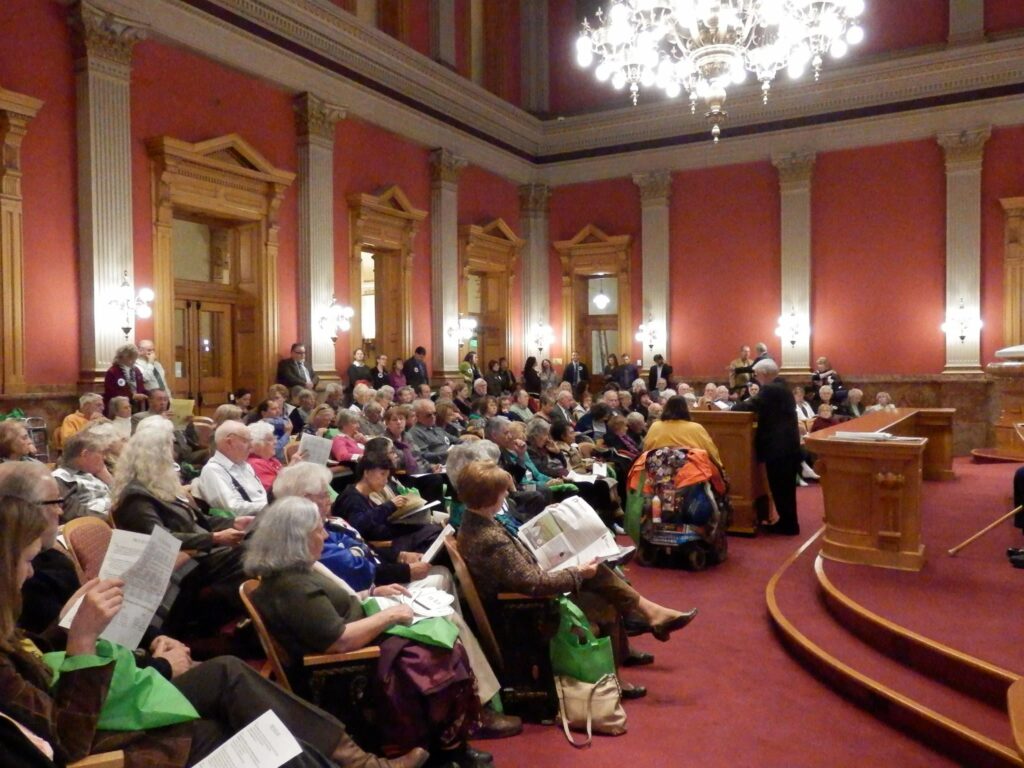
Every day a car pulls up in front of my 90-year-old neighbor’s house. A volunteer hops out and heads up the front walk to drop off a meal and visit with Delores. This daily meal delivery is a key ingredient in Delores’ recipe for thriving in the home she has lived in for decades. Other ingredients include neighbors who shovel snow from her sidewalk and her family members who stop by for conversation, meals or to take her places.
There’s a complex apparatus between services like a daily meal delivery and the federal, state and county programs geared toward supporting older Coloradans like Delores. And in 2015, the Colorado General Assembly sought to face this apparatus strategically toward the future by passing House Bill 15-1033. Once the bill was enacted, the Strategic Action Planning Group on Aging (SAPGA) was formed, the Governor gained a senior advisor on aging, and statewide plans such as the 2020 Strategic Action Plan on Aging and Lifelong Colorado: Colorado State Plan on Aging (2019-2023) were developed.
Why these moves toward a forward-thinking approach? From 2020 to 2050, the Colorado State Demography Office estimates that the state’s 65 and older population will nearly double, growing from roughly 876,000 to more than 1.6 million.
From 2020 to 2050, the Colorado State Demography Office estimates that the state’s 65 and older population will nearly double, growing from roughly 876,000 to more than 1.6 million.

Strategic plans need what some people call “meat on the bones.” Once frameworks are established, the work gets done through the addition of funding, program details, goals, data, and staffing. Alongside all that, longer standing frameworks like the Older Coloradans’ Act need modernizing.
The Colorado General Assembly’s take on older adults was on my mind in the inaugural installment of The Gray Zone back in January 2020. And the state lawmaking body is on my mind again as the legislative session kicked off Jan. 12.
Advocates for older adults—and lawmakers who are listening to them—have been hard at work for months preparing bills they believe will help the State of Colorado better support older adults as the population increases.
They’d also like the state to better leverage what older adults have to offer. For example, in my neighbor’s case, many of the people who keep her care circle moving smoothly are themselves in their 60s and 70s. And Delores herself is a one-woman economic engine. She supports neighborhood businesses, pays property taxes, and compensates local teens for raking leaves and mowing her grass.
With Delores on my mind, I caught up with Colorado Center for Aging (CCA), the Alzheimer’s Association Colorado Chapter, and AARP of Colorado to learn about what’s on their radar as the legislative session opens.
Jeanette Hensley and Rich Mauro of CCA, formerly Colorado Senior Lobby, co-chair the organization’s advocacy committee and have been working for several years to help lawmakers think more strategically about older Coloradans. This session Mauro and Hensley are “looking forward to some real advancement in how the state addresses age-related issues.”
CCA expects to be involved with a number of bills to modernize the Older Coloradans’ Act. A bill to prevent employers from requiring high school and college graduation dates on job applications is top-of-mind. And they’re excited to see a bill to add geriatrician training to existing medical specialties (i.e., pharmacy, dental, ophthalmology). And, as is the case each session, CCA will get involved with bills impacting affordable housing, HOAs, fraud and consumer issues, and more.
The Alzheimer’s Association Colorado Chapter is supporting a bill to require dementia-specific training for all direct care workers in assisted living residences, nursing care facilities and Adult Day Services centers. According to the organization’s 2018 Dementia Care Practice Recommendations, “The single most important determinant of quality dementia care across all care settings is direct care professionals.” When staff have the tools to do their job well, they feel more confident in their work, they find more enjoyment in it, and they are less likely to burn out. And for people living with dementia, consistency in routines and caregivers is key.
The Association points to an anticipated 21% growth in the number of Coloradans living with Alzheimer’s disease between 2021 and 2026. And with Black and Hispanic Americans disproportionately more likely than White Americans to have dementia, efforts to attain and maintain quality care across all settings will support the state’s equity goals.
Coral Cosway, Senior Director of Public Policy & Advocacy for the Alzheimer’s Association Colorado Chapter looks back to the months when the need for such a requirement came into focus. “While visitation was restricted, our staff heard from numerous families across the state that their loved ones were struggling. Family members frequently serve as translators for and informal caregivers to residents, supporting the work of the direct care staff. This situation highlighted the need for all direct care staff to be appropriately dementia trained.”
Senator Chris Kolker of Arapahoe County and Representative Mary Young of Weld County will sponsor this bill, which is expected to be introduced by Kolker on the first day of the session. For Kolker, “As the number of Coloradans with dementia continues to rise, we need to ensure direct care workers have the tools necessary to provide the best care possible. Enhanced dementia training will not only improve the quality of care for those in need, it will better prepare our direct care professionals, reduce turnover, and help strengthen our workforce. I’m grateful for the Alzheimer’s Association of Colorado for their collaboration on this important bill and will fight to get it passed during the upcoming
legislative session.”
Allison Hiltz, State Advocacy Manager for AARP Colorado will be following these bills too, as well as others connected to broadband access and equity throughout the state, affordable housing, and COVID-19 (further protecting residents in congregate care settings). Hiltz and AARP Colorado are poised for action once bills have been introduced and complete text is available for review.
Colorado Center for Aging To get involved with CCA at the Capitol (or by Zoom), visit coloradocenterforaging.org. North Denver in the Colorado General Assembly State House District 4 Representative Serena Gonzales-Gutierrez: serena.gonzales-gutierrez.house@state.co.us 303-866-2954 State House District 5 Representative Alex Valdez: alex.valdez.house@state.co.us 303-866-2925 State Senate District 34 Senator Julie Gonzales : julie.gonzales.senate@state.co.us 303-866-4862
The Gray Zone will follow these efforts and check in with North Denver’s state lawmakers to learn about their involvement in these and other bills over the course of the session.
Kathryn has lived in North Denver since around the time the Mount Carmel High School building was razed and its lot at 3600 Zuni became Anna Marie Sandoval Elementary. She’s raised two children in the neighborhood, worked at several nonprofits, and volunteered with the Alzheimer’s Association Colorado Chapter.
Do you have story ideas for The Gray Zone? Email Kathryn@DenverNorthStar.com.

Be the first to comment